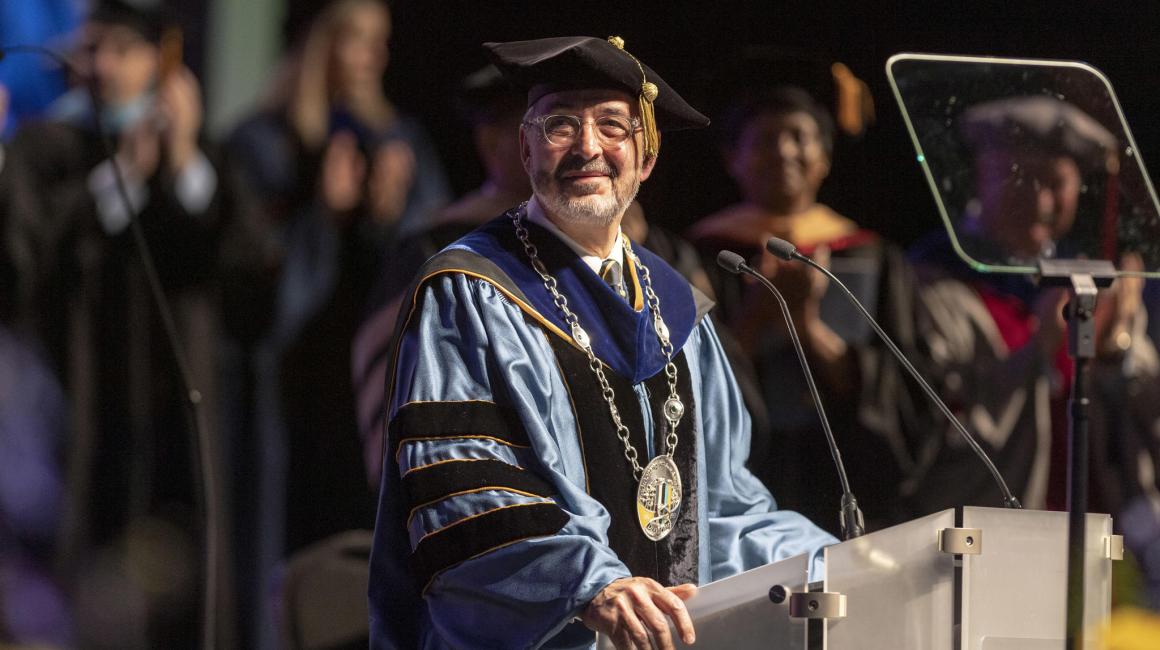
Photography by: Roger Hart, Miranda Hopkins and Scott Soderberg
The day certainly had the look and feel of the start of something new at the University of Michigan-Dearborn. Adorned with oversized maize and blue banners and a grand piano at centerstage, the Fieldhouse was transformed from a venue for basketball and hockey into something suggesting a performance hall. Xiang Gao, an internationally acclaimed violinist who has entertained world dignitaries, including three U.S. presidents, wowed the audience with an emotional piece from a French opera. And some new ceremonial accessories even made their debuts — including new college flags and a mace, which will now become part of the university’s future legacy.
The festivities were, of course, a celebration of the inauguration of Domenico Grasso as UM-Dearborn’s sixth chancellor. But it also offered a moment to reflect on the university’s past and present accomplishments. Grasso’s own remarks appropriately blended history and future — situating the challenges and promise that lie ahead in the context of larger issues like inequality, discrimination and the Jekyll-Hyde influence of technology in our society. And he spoke of drawing strength from past ambitions — harkening back to an era in which many of the nation’s great educational institutions, including the University of Michigan, were founded on a vision of empowering the working class.
“Alarmingly, we now find ourselves in an era where wealth disparity is at an all-time high and where the role of the common individual is increasingly marginalized and threatened,” Grasso said during his inauguration address. “To be sure, we cannot allow this marginalization to go unchecked. As a society, we can ill afford not to capitalize on the diverse wisdom, creativity and capacity of the vast majority of our population.”
Unlike most inaugurations to political office, this one didn’t mark the official start of a tenure. Indeed, Grasso has been on the job for nearly a year now — a period in which he and his leadership team have been laying the ground for what could be some major transformations. He has started by setting some bold goals, including potentially doubling the number of students UM-Dearborn serves over the next decade; pushing graduation and retention rates toward the 70-percent mark; and building the philanthropic and student aid infrastructure that could get us there.
"Alarmingly, we now find ourselves in an era where wealth disparity is at an all-time high and where the role of the common individual is increasingly marginalized and threatened."
But Grasso also reasoned that reaching these heights at a time when the very nature of higher ed is increasingly being questioned by the public will entail a fundamental reimagination of the university experience. “We must discover how to educate differently,” Grasso said. “Of course, that includes exploring new modes of delivery, organizing our departments, our classes, our internships. But it also includes exploring and implementing new and better ways of engaging and supporting our students in and out of the classroom, and assuring their success.”
Getting there will be a community endeavor, a team effort. Late last year, Grasso announced the launch of a strategic planning initiative that will be the core activity of 2019. The hope is to engage faculty, students, staff, alumni, leadership, industry partners and the larger community in an open-minded, open-ended conversation about our fundamental educational model. The details are still coming into focus, but the underlying message is clear: Grasso wants the UM-Dearborn community to think beyond tweaks at the margins.

For example, an early activity designed to prime faculty and staff for the creative process asked participants to imagine what structures they would build today if the university had no prior history. Another inspirational exercise: A TED-like speaker series featuring talks from people working on higher education’s wildest frontiers. At the first event, Richard Miller, president of the internationally recognized experimental institution Olin College, laid out how Olin is reinventing engineering education with an intensive all-residential campus and doing away with higher ed absolutes like academic departments. Grasso isn’t necessarily advocating those changes in particular, but it signals his openness to coloring outside the lines.
Some of the actual planning work is also underway. Two new working groups are now conducting a full situational analysis of UM-Dearborn’s current organizational strengths and challenges, and determining what trends in the external environment may impact its future. Those teams are looking at everything from new data analytics technologies that help students map out their optimum paths to graduation, to adaptation strategies for some likely macro-level disruptions. Diminishing levels of state funding and forecasts of a shrinking, aging population across the upper Midwest, mean the stakes are high.
That work will accelerate through the summer and fall, with a goal of concluding portions of the strategic planning process in early 2020. After that, look for some of those big ideas to debut in policy and practice.
“Without doubt, there remain many exciting and revolutionary advances to which we will offer witness in our lives,” Grasso said in closing. “Equally certain is that the challenges and opportunities we face will require our collective genius, imagination and resourcefulness. So let us begin this journey together, knowing that — through our collective action, creativity and determined effort — we can make a profound difference.”